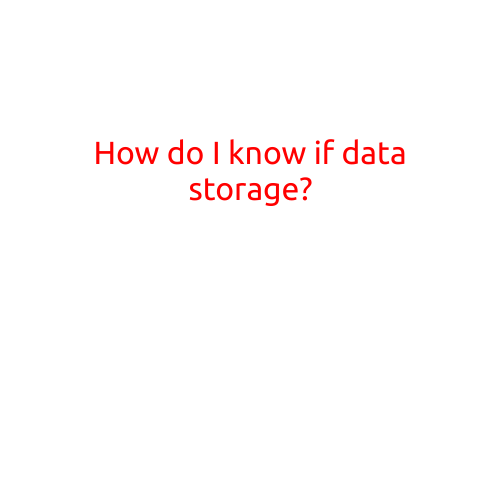
How Do I Know If I Need Data Storage?
In today’s digital age, data is being generated at an unprecedented rate. From personal photos and documents to business records and databases, data is an essential part of our daily lives. As a result, storing and managing this data has become a crucial task for both individuals and organizations. But how do you know if you need data storage?
In this article, we’ll explore the signs that indicate you need data storage, and what you can do to ensure your data is safe and secure.
Signs You Need Data Storage
- Running Out of Space: If you’re constantly running out of space on your devices, it’s a clear indication that you need data storage. Whether it’s your computer’s hard drive, smartphone’s storage, or cloud storage, running out of space can make it difficult to store important files and data.
- Data Loss: Data loss is a common issue, especially when devices crash, get damaged, or infected with malware. If you’re experiencing frequent data loss, it’s essential to consider data storage to prevent losing vital information.
- Increased File Sharing: If you’re sharing large files with colleagues, friends, or family members, it’s a sign that you need data storage. Sharing large files can be time-consuming and unreliable, especially when it comes to cloud storage.
- Business Growth: For businesses, data storage is crucial for growth and expansion. As your business grows, so does the amount of data you accumulate. Investing in data storage ensures that you can store and manage your data efficiently.
- Regulatory Compliance: If your business or industry requires regulatory compliance, such as GDPR or HIPAA, data storage is a necessity. Failing to comply with regulations can result in severe consequences.
Types of Data Storage Options
- Cloud Storage: Cloud storage provides a flexible and scalable solution for storing and managing data. Popular cloud storage options include Google Drive, Dropbox, and Microsoft OneDrive.
- On-Premises Storage: On-premises storage involves setting up and managing your own storage infrastructure within your organization. This can include servers, NAS, and SAN devices.
- Hybrid Storage: Hybrid storage combines cloud and on-premises storage to provide a flexible and scalable solution.
- Object Storage: Object storage is a cost-effective solution for storing large amounts of unstructured data, such as images, videos, and documents.
Benefits of Data Storage
- Increased Security: Data storage provides an additional layer of security, ensuring that your data is protected from unauthorized access and data breaches.
- Improved Collaboration: Data storage makes it easier to collaborate with teams and stakeholders, as data can be shared and accessed easily.
- Scalability: Data storage solutions can be scaled up or down depending on your needs, ensuring that you can manage your data efficiently.
- Reduced Costs: Data storage can reduce costs associated with data loss, downtime, and redundant data storage solutions.
Conclusion
Data storage is essential for individuals and organizations alike. Whether you’re experiencing data loss, storage limitations, or business growth, investing in data storage can provide a range of benefits, including increased security, improved collaboration, and reduced costs. By recognizing the signs that indicate you need data storage, you can ensure that your data is safe, secure, and easily accessible.





